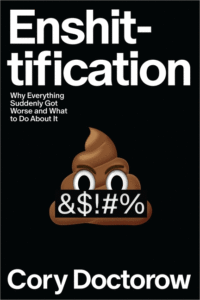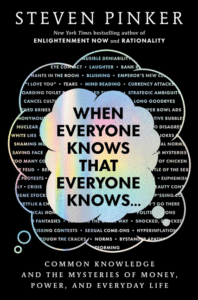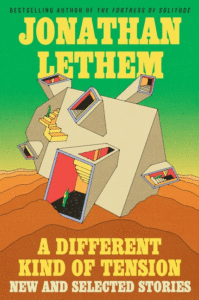
5 Book Reviews You Need to Read This Week
“A masterly polemic, its scope so sweeping that it does, finally, seem to explain every pungent odor wafting from Silicon Valley.”
Our feast of fabulous reviews this week includes Dan Pipenbring on Cory Doctorow’s Enshittification, Alexandra Kleeman on Katherine Dunn’s Near Flesh, Becca Rothfeld on Steven Pinker’s When Everyone Knows That Everyone Knows, Leo Robson on Jonathan Lethem’s A Different Kind of Tension, and Robert Rubsam on Jon Fosse’s Vaim.
Brought to you by Book Marks, Lit Hub’s home for book reviews.
*
“This may sound merely like capitalism at work; Doctorow, following the economist Yanis Varoufakis, thinks it’s closer to feudalism. Capitalists, after all, prefer to make money by investing in machines, labor, production; feudalists just extract rent from the land they already own. Having secured both monopolies and monopsonies, tech companies behave more like rapacious rentiers than proper capitalists. They’ve ground the internet’s once-untrammeled traffic to a halt, installing deceptively cheery tollbooths at every bridge and tunnel.
…
In his account of the Great Enshittening, Doctorow offers a masterly polemic, its scope so sweeping that it does, finally, seem to explain every pungent odor wafting from Silicon Valley: Here are Amazon’s delivery drivers—who are seldom classified as employees, of course, but as independent contractors—so overworked that they pee in bottles and chuck them out their windows; so desperate for cash that they hang burner phones on trees outside Amazon’s warehouses, tricking the dispatch algorithm into thinking they’re ready for more jobs. Here are the anti-suicide nets at Foxconn’s Chinese sweatshops, the teeny-tiny Apple logos engraved on the smallest iPhone parts to guard against unauthorized repair. Here is the George Orwell estate, persuading Amazon to purge copies of Nineteen Eighty-Four and Animal Farm from customers’ Kindles. Enshittification can explain the baffling rise of cheap, nonsense-named brands on Amazon, such as Quefe or Hitonass or Pooplunch (yes, those are real); the proliferation of cars that refuse to start if you miss a payment; the insistence that we download the app instead of using the website.
And Doctorow tells it all in good humor. Somehow he believes that tech can be brought to heel, that a coalition of the fed up and fearful will usher in a new wave of trust-busting regulation, or at least nudge things in the right direction. I hope he’s right. It would be nice for the digital millennium to survive for at least a century.”
–Dan Pipenbring on Cory Doctorow’s Enshittification: Why Everything Suddenly Got Worse and What to Do about It (Harper’s)
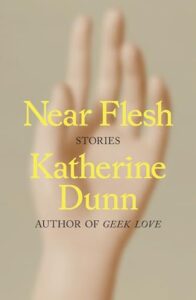
“While novels can afford to be like marathons—long, arduous and discursive in a way that mirrors a life—short stories work best when they pack a punch. Katherine Dunn, the venerated author of the 1989 novel Geek Love, was already an expert in the actual pugilistic arts: For many years she worked as a sportswriter, covering boxing for The Willamette Week in Oregon. With the publication of her first and only story collection, Near Flesh, nearly a decade after her death, Dunn proves that she could throw a brisk hook from the page, too.
These stories—like her posthumously published novel, Toad (2022)—were gleaned from Dunn’s archive at Lewis & Clark College, and many are appearing in print for the first time. The collection is a welcome reminder that literature can be not only a showcase for polished, refined sentiment but also an arena in which both reader and writer grapple—with imminent challenges, with their own psyches, with the uncertainty of survival.
Dunn’s pieces have an almost irrepressible kinetic energy: Plot and character jostle within the bounds of tight word counts, protagonists come out swinging at obstacles both real and psychological, and situations that other authors might render through internal monologue are expressed as eruptions of action.
…
“As I read, I began to think that Dunn did not believe in many of the niceties of literary fiction, or that thought and feeling were any less bruising than action. Living, feeling, thinking—all are bodily acts, and perhaps, as in the boxing ring, they all result in a winner and a loser.
While there are some pieces in the collection that are only single-round bouts—the drama extinguished before it can even take hold—they cut to the quick of life and highlight the struggle for survival even in cultivated, orderly spaces. Her fascination with the mechanics of thinking and acting when few options exist lends her characters’ efforts a gravity that is wholly without sentimentality or overseriousness. That quality, in itself, is a knockout punch.”
–Alexandra Kleeman on Katherine Dunn’s Near Flesh (The New York Times Book Review)
“Pinker’s book all too often reads like a hammer in search of a nail. He returns helplessly to his idée fixe, wokeness and its perils, whether it bears any relationship to the theme of common knowledge or not. At one point, he interrupts the book’s line of argument with the air of a man tapping a spoon on his glass. You can almost hear him clearing his throat just before he announces: ‘First, a few words on why academic freedom should matter to people outside academia.’ And all for the purpose of indulging in a tirade about the ‘postmodern current in the humanities.’
The horse that was long ago beaten to death, ‘cancel culture,’ limps in for a posthumous appearance in Chapter 8, ‘The Canceling Instinct.’ ‘The repression of controversial ideas,’ Pinker writes, ‘is no longer a hallmark of theocracies and dictatorships but increasingly a fixture of universities, the very institutions most committed to exploring ideas.’
…
“Game theory puzzles—such as the ‘prisoner’s dilemma’—have their uses, but there is only so much they can probe. If we limit ourselves to discussing the class of truths that game theory and economics can comfortably tackle, we will never have occasion to discuss the truths of aesthetics or politics, and many other truths besides. There are more things in heaven and Earth than are dreamt of in Pinker’s arid philosophy—art and love among them. Yet Pinker is so confident in his mode of inquiry, so incurious about anything that spills beyond its tidy bounds, that he tries to enfold even unwieldy and sprawling truths into his cramped formal apparatus.
…
“This is the kind of public intellectualism that makes the public hate intellectuals. Instead of showing what ideas have to teach us about life, Pinker holds a gun to life’s head and demands it conform to his thought experiments. And he does it with the patronizing tone of someone telling his readers what to think from on high.
…
“His mode is that of the popularizer, an expert tasked with taking a topic he has already grasped, chewing it into a pap and spitting it into the mouths of lowly amateurs, his readers. The best public intellectuals, in contrast, are not popularizing but probing—animated by questions they want to pose, not certainties they want to impart. Their questions can and should be informed by research and expertise that the reader may not have mastered, but they should still be questions, not answers that have ossified into a dreary dogma. One benefit of the probing approach is that it forces the public intellectual to treat the reader as a co-conspirator—as an equal, as someone it is worth asking with. Pinker, in contrast, is lecturing. He already knows what he thinks about everything.”
–Becca Rothfeld on Steven Pinker’s When Everyone Knows That Everyone Knows: Common Knowledge and the Mysteries of Money, Power, and Everyday Life (The Washington Post)
“Jonathan Lethem doesn’t issue any grand claims for his new book, A Different Kind of Tension, a sampling of stories old and new. Though he specializes in surreal black comedy, and writes frequently about male unease and the horrors of the near future, he offers the collection not as a mosaic or cumulative statement—serial dispatches from Lethem-land—but simply as a record of his ‘persistence in making myself available to a form I’d never claim to have mastered.’
This is either feigned humility or a sanguine acceptance that some of his contemporaries—George Saunders or David Foster Wallace, say—have done more with the short story or given more of themselves to it, approaching similar terrain with greater gusto or a more potent vision. Whatever the case, Lethem’s claim is rather understated: For almost 40 years, he has made himself extremely available. The book draws from no fewer than five collections and reprints 11 stories that didn’t make it into any of them.
…
“As a short-fiction writer, Lethem was at his strongest—his most limber, lucid, inventive and wise—for around a decade starting in the early to mid-2000s, roughly his 40s. Moving away from straight science fiction, he placed fantastical logic against recognizable backdrops, and commanded a range of tonal effects … A good Lethem story exhausts the juiciest permutations of a scenario while managing not to outstay its welcome.
…
“Though we can take Lethem at his own estimation and treat him as a failed or would-be master—a mere committed grafter—it is difficult, on the basis of this excellent collection, to generate much of a case.”
–Leo Robson on Jonathan Lethem’s A Different Kind of Tension: New and Selected Stories (The New York Times Book Review)
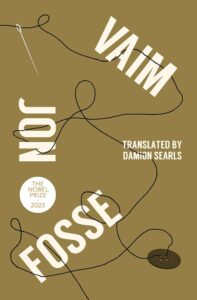
“‘The act of writing,’ the Nobel Prize-winning novelist and playwright Jon Fosse has said, ‘is one of listening.’ His novels, for all their stylistic experimentation and temporal slipperiness, have a distinctly oracular quality: tales of hard lives in Norway’s fjords, they compress lifetimes into shining moments, and they are told to us earnestly and directly, if poetically.
…
“In his Nobel Prize lecture, Fosse spoke of a ‘silent language’ that serves him as a guide, directing him by intuition rather than intention. At his best, this generates a sensation of existential contingency in the reader, a quality of chance at odds with the fixed linguistic content of a novel. Vaim floats between states, intermingling life and death, present and past, an interstitial novel about lives that never quite arrive at their culmination. When Jatgeir attempts to express this, the result is incomplete, full of pauses and retractions: ‘In a way reality has probably always been, yes, no, no not like a dream, but reality has had something dreamlike about it too probably my whole life, reality is in the dream the way the boat is in the water, I think.’ Not exactly poetic, but this vision of a life spent bobbing between the fixed and the dreamlike neatly describes Fosse’s oeuvre, where language gestures beyond itself and life speaks, sometimes, in silence.
…
“In Vaim, we listen to three partial stories of small lives and small problems that have yet to coalesce into a complete narrative. These narrators compel us from page to page, sweeping us along on a tide of modest events, insisting on each new development with the intimate immediacy of real life. But no moment really rises above any other, and the novel goes slack even in moments of ostensible urgency. We listen to the accounts of these men, and when they fall silent, the novel does too. Like water washing over a deck, Vaim soaks the skin, but is quickly gone.”
–Robert Rubsam on Jon Fosse’s Vaim (The Washington Post)
Book Marks
Visit Book Marks, Lit Hub's home for book reviews, at https://bookmarks.reviews/ or on social media at @bookmarksreads.









